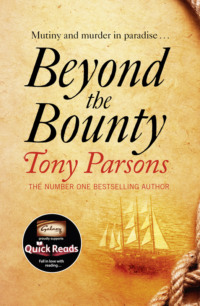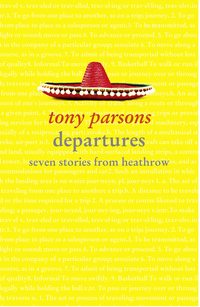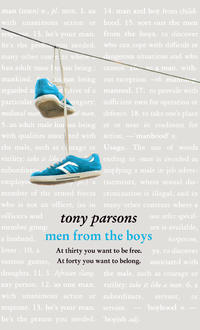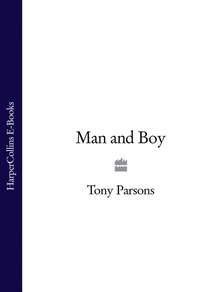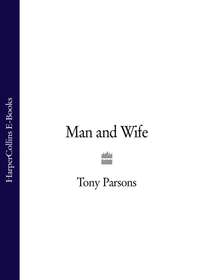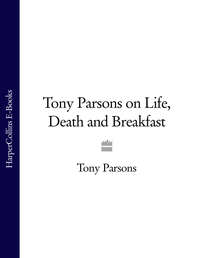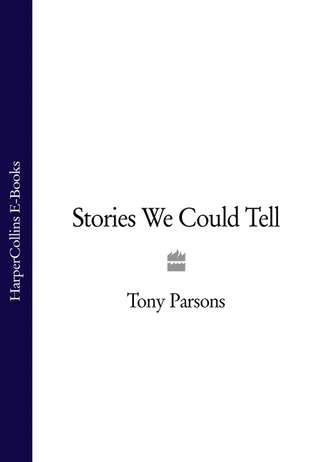
Полная версия
Stories We Could Tell

STORIES
WE COULD
TELL
Tony Parsons

HarperCollinsPublishers
For David Morrison of Hong Kong
Table of Contents
Cover
Title Page
Dedication
Part One: 1977 - You May Not Be An Angel
Chapter One
Chapter Two
Chapter Three
Chapter Four
Chapter Five
Chapter Six
Chapter Seven
Part Two: 1977 - Angels are So Few
Chapter Eight
Chapter Nine
Chapter Ten
Chapter Eleven
Part Three: 1977 - Lovers of Today
Chapter Twelve
Chapter Thirteen
Chapter Fourteen
Chapter Fifteen
CODA: 1977 - Another Girl, Another Planet
Chapter Sixteen
About the Author
By the Same Author
Copyright
About the Publisher
‘I Feel Love’ Words and Music by Giorgio Moroder, Pete Bellotte and Donna Summer © 1977 WB Music Corp, USA and Sweet Summer Night Music (66.67%) Warner/Chappell Music Ltd, London W6 8BS (33.33%) Warner/Chappell Artemis Music Ltd, London W6 8BS. Lyrics reproduced by permission of IMP Ltd. All Rights Reserved.
‘Stories We Could Tell’ Words and Music by John Sebastian © 1972 (renewed) Warner-Tamerlane Publishing Corp and Chicken Flats Music Inc, USA Warner/Chappell North America Ltd, London W6 8BS. Lyrics reproduced by permission of IMP Ltd. All Rights Reserved.
‘All You Need Is Love’ Words and Music by John Lennon and Paul McCartney © 1967 Sony/ATV Music Publishing (UK) Ltd. All Rights Reserved.
‘Shame’ Words and Music by Reuben Cross and John Henry Fitch Jr © 1975 Dunbar Music Inc, USA, Warner/Chappell North America Ltd, London W6 8BS. Lyrics reproduced by permission of IMP Ltd. All Rights Reserved.
‘Dancing Queen’ Words and Music by Benny Andersson, S. A. Andersson, Björn Ulvaeus © 1976 BOCU Music Ltd. Lyrics reproduced by permission of BOCU Music Ltd, 1 Wyndham Yard, London W1H 2QF. All Rights Reserved.
‘5.15’ Words and Music by Pete Townshend © 1973 Fabulous Music Limited, London SW10 OSZ. International Copyright Secured. All Rights Reserved. Used by permission.
‘Goodness Gracious Me’ Words and Music by David Lee & Herbert Kretzmer © 1960 TRO Essex Music Limited, London, SW10 OSZ. International Copyright Secured. All Rights Reserved. Used by permission.
‘I’ll String Along With You’ Words by Al Dubin and Music by Harry Warren © 1934, M. Witmark & Sons, USA. Reproduced by permission of B. Feldman & Co Ltd, London WC2H 0QY.
‘If I Can’t Have You’ Composed by Barry Gibb/Maurice Gibb/Robin Gibb. Published by BMG Music Publishing International Ltd. Used by permission. All Rights Reserved.
Although the Publisher has made every effort to trace and contact all copyright holders before publication, this has not been possible in every case. If notified, the publisher will be pleased to make any necessary arrangements at the earliest opportunity.
Chapter One
They stopped him as he was coming through customs. Why wouldn’t they stop him? Terry looked like trouble.
His skin pale from too many sleepless nights and God knows what else, the second-hand suit jacket from Oxfam, the CBGB’s T-shirt, Levi’s that hadn’t been touched by water since the day he bought them and wore them in the bath (his mother telling him he would catch his death, his father telling him he was bloody mental), Doctor Martens boots and – the crowning glory – his short, spiky hair dyed black, and badly, from a bottle of something called Deep Midnight that he had found at the bottom of the ladies’ grooming counter in Boots.
‘One moment, sir.’
Sir used like a weapon, like a joke. As if anyone would seriously call someone like Terry sir. Two customs men, one of them knocking on for thirty, with mutton chops and a mullet, like some King’s Road footballer trying to keep up with the times, and the other one really prehistoric, maybe even as old as Terry’s father, but lacking the old man’s twinkle.
‘Been far, sir?’
This from the elderly geezer, ramrod straight, all those years in uniform behind him. ‘Berlin,’ Terry said.
The younger one, as hairy as a character from Dickens, was already in Terry’s plastic Puma kitbag, pulling out his God Save the Queen T-shirt, his silver tape recorder, a spare pack of batteries, a microphone and a change of Y-fronts.
As Terry’s mum always pointed out, you never knew when you were going to get knocked over.
‘Berlin? Must be lovely this time of year,’ said muttonchops, and the old soldier sniggered. They thought they were funny. The Eric and Ernie of Terminal Three.
The old soldier flipped open Terry’s thick blue passport and did a double take. The pale-faced, black-haired youth before him bore little resemblance to this incriminating snapshot from Terry’s previous life, his mousey-haired and baggy-flared life, the living at home with Mum and Dad life, the working at the gin factory life when he walked around lost in dreams, and all his dreams were of getting out.
In the mug shot Terry peered out at the world from under a failed feather cut, trying to look like Rod Stewart but coming out more like Dave Hill of Slade. He even had the start of a suntan. It was a snapshot from when Terry was still waiting for his life to start, and his cheeks were burning as the old soldier closed the passport.
Then muttonchops was digging deeper in the kitbag, making Terry flinch now, because he was touching the things that really mattered to him, pulling out a two-week-old copy of The Paper with Joe Strummer on the cover, looking as beautiful and doomed as Laurence Harvey in Room at the Top. He flipped the big inky broadsheet open, gawped blankly at the news pages, at headlines that meant nothing to him.
This Year’s Costello. Talking Head Cases. Bachman Turner Overdrive Disband. Muddy Waters – Hard Again. Fanny to Warm Up Reading?
Quickly flicking through The Paper now. Not even glancing at the double-page centre-spread cover story on the Clash by Skip Jones, the greatest music writer in the world, but pausing – as if that’s what it was all about! – when he got to the classifieds.
‘Dirty Dick’s Records – get yourself a dosel muttonchops read out loud, pulling a face. ‘That’s disgusting, that is.’
He tossed The Paper to one side and rummaged deeper, producing Terry’s battered copy of The Kandy-Kolored Tangerine-Flake Streamline Baby with entire paragraphs underlined, and then the truly irreplaceable – cassettes from Terry’s recent interview with the legendary Dag Wood, the only man to be booed off stage at Woodstock.
Terry watched the priceless cassettes being handled as though they were something that they gave away with the petrol and he felt like telling the bastards to do something useful, like go and catch Carlos the Jackal.
But he thought that might be an invitation to a full body search, so he bit his lip, clenched his buttocks and wondered how long his girlfriend would wait for him.
‘And was your trip business or pleasure, sir?’ said the old soldier.
‘I’m a journalist.’
It still gave him a kick to say that – nine months into the job and it gave him a thrill to see his name in a by-line, especially next to the postage-stamp picture you sometimes got. Small things, but they signified that Terry was becoming the someone he had always wanted to be. They couldn’t stop him now.
‘A journalist?’ said the man, a note of suspicion in his voice, as if a real journalist should be wearing a suit and tie, or carrying a briefcase, or old or something. ‘What you write about then?’
Terry smiled at him.
It was the end of a summer day in 1977 and there was something in the air, and in the clubs, and pouring out of every radio. Everything was suddenly good again, the way it had been good ten years ago, back in the Sixties, when Terry was a child, and his parents still thought that the Beatles seemed like nice boys.
What did he write about? He wrote about the way everything was changing. From haircuts to trousers, and all stops in between. What did he write about? Oh, that was a good one.
Terry thought of something that Ray Davies had said recently, about how he felt like sobbing his heart out whenever he looked at anyone’s record collection, because it was just so moving to see that personal soundtrack laid out before you, naked and open and fading with the years, because if you cared about this kind of thing then it was all there among the scratched vinyl and the cracked gatefold sleeves, as plain as could be, all the hopes and yearnings of someone’s private universe, and everything that a young heart could possibly want or need or yearn for.
‘I write about music,’ Terry said.
Misty was waiting for him at the arrivals gate.
He saw her before she saw him. He liked it that way. It was one of his favourite things in the world – to see her before she saw him.
Misty. His honey-haired, cat-faced darling. Tall and slim in a simple white dress matched with a pair of clonking great biker boots.
Girls were starting to do that all the time, pairing something undeniably feminine – mini-skirts, fishnet tights, high heels, Misty’s simple white dress – with something brutally male – DMs, spiked dog collars and wrist bands, Misty’s motorcycle boots. Throwing their sex in your face, Terry thought, demanding to know what you were looking at, and silently asking you what you were going to do about it. It was a new thing.
Slung over her shoulder was a bag with her camera equipment. Dangling from one of the straps, where you might expect to find a little plastic gonk or perhaps a figurine of the Fonz or Han Solo, there was a pair of handcuffs – pink fake mink handcuffs. You couldn’t tell at first glance if they came from a toyshop or a sex shop.
Misty and her pink fake mink handcuffs. Terry sighed at the sight of her.
She was like a girl from a book. No, a woman – you couldn’t say girl any more, that was another of the new things, it wasn’t allowed to say girl, you had to say woman, even when they were still – technically, legally – girls. Misty had explained it all to Terry – it was something to do with what she called the suffocating tyranny of men.
Funny that, thought Terry.
Yes, she was like the bird – woman – in the Thomas Hardy novel they read at school, the year he dropped out and went to work in the factory. Far from the Madding Crowd. Misty was like the woman in there – all female softness, but with a thread of steel you couldn’t guess at by looking at her. Bathsheba Everdene. That was Misty. Bathsheba Everdene in a white dress and biker boots, Bathsheba Everdene with a pair of pink fake mink handcuffs.
She still hadn’t seen him, and the sight of her face scanning the crowd full of strangers made his soul ache. Then she caught his gaze and started jumping up and down, so glad to see him again after being apart for so long.
Over a week!
She ducked under a sign that said STRICTLY NO ENTRY and ran to him. She wasn’t the kind who cared about signs, she moved through the world as if she had a right to be there – anywhere, everywhere. Like a woman in a book, like a girl in a song.
‘Look, Tel,’ she said.
She had the most recent copy of The Paper in her hands. Almost a week old, and somehow the ink was still damp, and her fingertips were black, and there on the cover was a gaunt, grim-faced man with platinum blond hair standing in a trench coat by a great wall with a sign that said, Achtung! Sie verlassen jetzt West Berlin.
Terry’s story on Dag Wood, written on a hotel laundry bag and phoned in from Berlin.
‘So what’s he like?’ Misty said, and he had to laugh, because normally the question drove him nuts.
You wrote a 3,000-word piece about someone and then everybody asked you, What’s he like then? What he was like was in the story, it was always in the story, or the story had failed. When Tom Wolfe wrote about Muhammad Ali, or Phil Spector, or Hugh Hefner, did people say, Yeah, Tom, but what are they really like? Probably. But Terry didn’t mind. As it was her. As it was Misty.
‘He’s the greatest,’ Terry said. ‘I’ll introduce you tonight, okay?’
Then Misty had that look in her eye, that sleepy, faraway look, and she was tilting her head to one side, so Terry placed his mouth on her mouth, and felt her fingers running through his dyed black hair, and the cameras that were stuffed inside her shoulder bag pressed through his Oxfam jacket and against his heart.
Their kisses tasted of Marlboro and Juicy Fruit, and as they snogged at the arrivals gate, completely wrapped up in each other, oblivious to the smirks and stares and snide comments – ‘What are that pair supposed to be dressed as, Dad?’ – neither of them doubted that their kisses would taste that way for ever.
Leon Peck was doing the singles.
He sat in the review room, the little corridor-shaped cubbyhole with a stereo where they went to listen to new music, and all around him were the week’s releases, maybe a hundred or more seven-inch 45s, some of them in the new-fangled coloured vinyl and picture sleeves.
Convention demanded that Leon found something to rave about – The Single of the Week – and then picked twenty or thirty other singles that were worthy of a cheap joke that could be told in one pithy, piss-taking paragraph.
A kind of spiteful irreverence had always been a part of The Paper’s appeal, and just under the title of every issue the readers were promised, ‘Hotsies, groovies, goldies and a rootin’, tootin’ tab of vicious controversy’. That was exactly what Leon needed to conjure up for his singles page. A rootin’, tootin’ tab of vicious controversy.
Except he couldn’t be bothered.
Something had happened to Leon at the weekend that made slagging off – let’s see, what do we have here? – ‘Float On’ by the Floaters or ‘Easy’ by the Commodores or ‘Silver Lady’ by David ‘Starsky’ Soul – or was he ‘Hutch’? – seem beneath him.
Something had happened at the weekend that had changed the way Leon looked at the world. So he picked up ‘Silver Lady’ -Starsky or Hutch grinning like a lobotomised Osmond on the picture sleeve – and flung it across the room like a Frisbee. The seven-inch slice of vinyl shattered with a satisfying, surprisingly loud crack against the far wall. It felt good.
So good in fact that Leon did the same with ‘Float On’. And then ‘Easy’. And then ‘You Got What It Takes’ by Showaddywaddy. Leon picked up ‘Fanfare for the Common Man’, the new single by Emerson, Lake and Palmer, and that was tossed with particular venom. Soon the review room was covered in shards of splintered vinyl.
Leon pushed back the stacks of singles and began leafing through the most recent issue of The Paper, sighing at the soul-shrivelling trivia of it all. Didn’t these people know what was going on in the world?
There was Dag Wood on the cover, doing his tired old heroic-junkie routine by the Berlin Wall. Leon was pleased for Terry – could imagine him puffing up with pride at the sight of his story on the cover – but come on. As if Lou Reed hadn’t done it all first and better! As if Dag Wood actually knew the difference between Karl Marx and Groucho!
Terry’s such a sucker for all that rock-god schtick, Leon thought. They all are up here.
Leon yawned, and turned to page two, sighing at the sight of the charts. Mindless disco crud ruled the singles – Donna Summer faking multiple orgasms all over ‘I Feel Love’ – and, top of the albums, music to help tranked-out housewives hobble through the menopause. The Johnny Mathis Collection.
Leon snorted with derision. He flicked through The Paper, his fingers, like his mood, becoming blacker by the second.
Eater to record first album during school holidays…new singles by Pilot, Gentle Giant and the Roy Wood Band…new albums by Ry Cooder, Boney M and the Modern Lovers…
And then – finally! – at the bottom of page 11, jostled into a corner by a massive ad for Aerosmith at Reading and a world exclusive on the break-up of Steeleye Span, there were a few brief paragraphs that held Leon’s interest and made his heart start pumping. The piece had his by-line.
The National Front plan to parade through a black neighbourhood this coming weekend. Hiding their racist views behind an anti-mugging campaign and countless Union Jacks, the NF plan to leave from Clifton Rise, New Cross. Their route and the time of the march remain undisclosed.
A peaceful counter demonstration planned by local umbrella group the All Lewisham Campaign Against Racism and Fascism (ALCARAF) will assemble in Ladywell Fields, next to the British Rail Ladywell Station, at 11 a.m.
Be there or be square.
The magazine had appeared on newsstands nationwide the previous Thursday, and in London as far back as last Wednesday. A lifetime away, thought Leon. Because last Saturday the march and the counter demonstration had combined to produce the biggest riot London had seen since the war. And Leon Peck had been there.
I was there, he thought, touching the bruise on his cheekbone where he had been clipped by the knee of a policeman on horse-back. I saw it happen. While many of his peers were dreaming of seeing Aerosmith at Reading, Leon had been in the middle of the riot at Lewisham, crushed in with the protesters being forced back by the police and their horses, and he had felt as if the world was ending.
Flags waving, bricks flying, policemen on horses riding into the crowds, the battle lines ebbing and flowing – screaming, righteous chaos all around. Orange smoke bombs on Lewisham High Street, the air full of masonry, dustbins, bottles and screams, taunts, chanting. The sound of plate-glass windows collapsing.
What he remembered most was the physical sensation of the riot, the way he experienced it in his blood and bones. His legs turning to water with terror as the air filled with missiles and the police spurred their horses into the crowd, his heart pumping at the sight of the loathing on the faces of the marchers, and the raging anger he felt at the sight of these bigots parading their racist views through a neighbourhood where almost everyone was black.
He had never felt so scared in his life. And yet there was never a place where he was so glad to be.
It mattered. It mattered more than anything. Leon Peck, child of peace and prosperity, had spent his Saturday afternoon doing what his father had done in Italy during the war, in Sicily and Monte Cassino and the march on Rome. Fighting Nazis.
Leon didn’t kid himself. Lewisham had been one Saturday out of his life. It couldn’t compare to what the old man had done in World War Two. But the experience had been like nothing he had ever known.
When he was younger than today, Leon had been involved in student politics at school and at university. But this was some thing else. The Pakistani shopkeeper at the end of the road where Leon was squatting had had his face opened up by a racist with a Stanley knife. The Nazis were coming back. It was really happening. And you either did something about it, or you went to see Aerosmith at Reading.
Later that sunny Saturday, just when the riot was starting to feel like one of those visions he’d had when he was dropping acid in the lecture halls of the London School of Economics, Leon had stopped outside an electrical shop on Oxford Street and watched the news on a dozen different TV sets. The riot was the first story. The only story. A quarter of the Metropolitan Police Force had been there, and they couldn’t stop it.
Leon wondered if any of the readers of The Paper had gone to Lewisham because of his few measly paragraphs. He wondered if he had done any good. He wondered if soon the – he had to consult his own article here – the ALCARAF would be the name on everyone’s lips. But then he turned the page and the classified ads brought him back to reality. This was what their readers were interested in.
LOOK SCANDINAVIAN! Scandinavian-style clogs – £5.50…Cheesecloth shirts for £2.70 plus 20p postage and packing…Cotton Drill Loons. ‘A good quality cotton drill in the original hip-fitting loons.’ Still only £2.60.
Leon’s thoughts turned reluctantly to fashion, and he wondered, Who wears this crap? Leon himself looked like a shorthaired Ramone – a London spin on a New York archetype. A style that said – I am making an effort, but not much of one.
Leon’s face and body had not quite caught up with the greasy machismo of his clothes. At twenty he was still whiplash thin, frail and boyish, looking as though he only had to shave about once a week.
His Lewis Leather biker’s jacket sported a plastic badge on the lapel featuring the Jimmy Hill-like profile of Vladimir Ilyich Lenin. He wore drainpipe Levi’s, a threadbare Thin Lizzy T-shirt and white Adidas trainers with three blue stripes down the side. Pretty much the standard uniform for the enlightened urban male in the summer of 1977, although Leon had topped off his look with a trilby hat from a charity shop. Funnily enough, you couldn’t buy that look in the back of The Paper, where they were still packaging what was left of the spirit of the Sixties.
Cannabis leaf jewellery. Solid silver leaf pendant on real silver chain - £7.
Leon closed The Paper, shaking his head. He adjusted his trilby. It was as if nothing had changed. It was as if there wasn’t a war on.
It seemed to Leon that everyone he knew was living in some old Sixties dream. The people he worked with at The Paper, all of the readers, his father – especially his father, a man who had belonged to CND for a few years but who now belonged to a golf club.
What was wrong with them? Didn’t they realise it was time to take a stand? What did they think the National Front was doing marching in South London? He touched the bruise on his cheek again, and wished it could stay there for ever.
This wasn’t about some little style option – the choice between long hair or spiky, flared trousers or straight, Elvis or Johnny Rotten. It was about a more fundamental choice – not between the NF and the SWP, who were daubing their rival slogans all over the city, like the Sharks and Jets of political extremism – but the choice between evil, hatred, racism, xenophobia, bigotry, and everything that was their opposite.
The memory of Lewisham still made him shake with fear. The rocks showering down on the marchers. The faces twisted with hatred. The police lashing out with truncheon, boot or knee. The sudden eruption of hand-to-hand fighting as marcher or demonstrator broke through the police lines, fists and feet flying. And the horses, shitting themselves with terror as they were driven into the protesters. Leon knew how those horses felt. Lewisham had been the first violence that he had been involved in since a fight in the playground at junior school. And he had lost that one.




